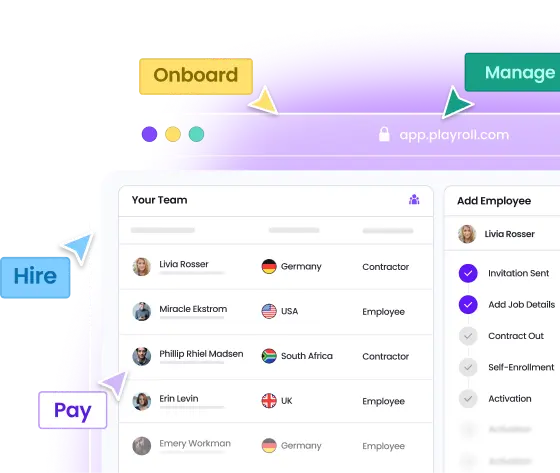What Are the Standard Working Hours in Lithuania?
An employee whose age is 18 or younger has a maximum of 8 hours per day and 40 hours per week. An employee whose age is 18 or older is allowed to work 40 hours per week. A minimum meal interval of 30 minutes must be observed by employees who work more than 6 hours in a day. In typical working hours, Monday through Friday, the hours are 8:00 AM to 5:00 PM, with a one-hour lunch break.
Maximum Working Hours in Lithuania
Employees in Lithuania are legally restricted to working no more than 12 hours per day (excluding breaks) and 60 hours per week (including overtime). Despite this upper limit, the average weekly working time—including overtime—should not exceed 48 hours. Overtime is usually capped at 8 hours per week but may be extended to 12 hours with the employee's written consent. Employers must obtain written consent unless in urgent cases where work is necessary to avoid significant damage or serve the public interest.
Industry-Specific Exceptions
Certain industries in Lithuania have unique working hour requirements. In sectors like healthcare and emergency services, extended shifts are common to ensure uninterrupted care. Transportation roles may also involve longer hours to accommodate logistics and travel demands. These exceptions are regulated to prioritize operational needs while upholding employee protections.
Managerial and Exempt Employees
Managerial and exempt employees in Lithuania—those with substantial decision-making authority or specialized skills—may not be subject to the standard working hour limitations. Although their daily or weekly hours might not be capped, they are still entitled to the mandated rest breaks and periods to ensure their well-being.
Statutory Full-Time Working Hours in Lithuania
Full-time employment in Lithuania is defined as 40 hours per week, generally divided over five working days. This standard is applicable across most industries, providing a benchmark for employment contracts and labor regulations.
Overtime Regulations in Lithuania
Overtime in Lithuania is closely regulated to protect employees while allowing flexibility for employers under clear legal frameworks.
What Counts as Overtime in Lithuania?
Overtime refers to any work performed beyond the standard 40-hour workweek. All overtime must be mutually agreed upon and documented through written employee consent, except in emergencies or public interest scenarios.
Maximum Overtime in Lithuania
The law allows up to 8 hours of overtime per week, with an annual limit of 180 hours. This may be extended to 12 hours per week if the employee consents in writing. Employers exceeding these limits without proper documentation may face penalties and legal consequences.
Overtime Payout Rates in Lithuania
Overtime pay in Lithuania is structured as follows:
- Standard overtime: 1.5 times the regular hourly rate.
- Overtime on rest days or during night hours (10:00 PM – 6:00 AM): 2 times the regular rate.
- Overtime on public holidays: 2.5 times the regular hourly rate.
Employees may also choose to receive additional paid leave instead of monetary compensation, as outlined in their employment contracts.
Rest Periods and Breaks in Lithuania
Employees in Lithuania are entitled to rest and break periods aimed at promoting health and preventing fatigue. A daily rest period of at least 11 consecutive hours must separate workdays, and a weekly rest period of no less than 35 consecutive hours—usually during weekends—is mandated. Employees working more than 6 hours in a day must receive a 30-minute unpaid meal break. Workers in physically demanding or extreme conditions are also entitled to special rest periods. Employers are obligated to ensure all rest period regulations are followed.
Night Shifts and Weekend Regulations
Night work in Lithuania is defined as any work conducted between 10:00 PM and 6:00 AM. Weekend work is permitted but must be compensated appropriately unless otherwise agreed upon in the employment contract. Both night and weekend shifts generally warrant a 1.5x pay rate. Starting January 1, 2025, overtime work during holiday nights must be compensated at no less than 2.5 times the employee's regular rate. In some cases, higher compensation may apply depending on specific terms or public holiday status.
Disclaimer
THIS CONTENT IS FOR INFORMATIONAL PURPOSES ONLY AND DOES NOT CONSTITUTE LEGAL OR TAX ADVICE. You should always consult with and rely on your own legal and/or tax advisor(s). Playroll does not provide legal or tax advice. The information is general and not tailored to a specific company or workforce and does not reflect Playroll’s product delivery in any given jurisdiction. Playroll makes no representations or warranties concerning the accuracy, completeness, or timeliness of this information and shall have no liability arising out of or in connection with it, including any loss caused by use of, or reliance on, the information.
.svg)
.svg)
.svg)





.svg)



.png)












.webp)









.svg)